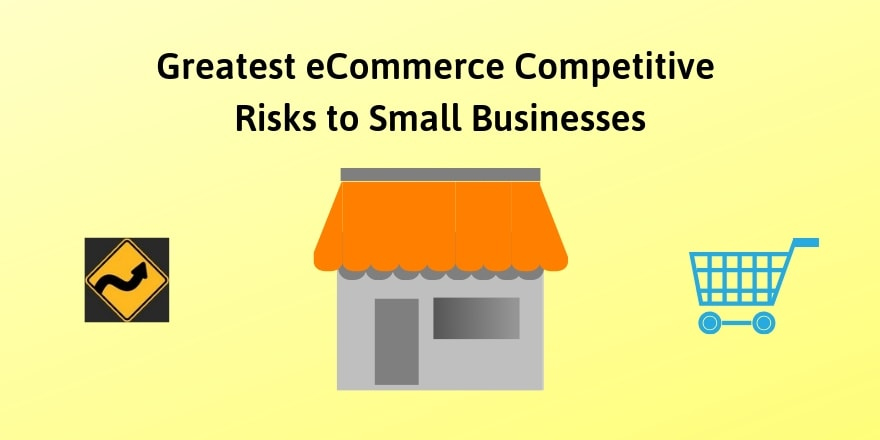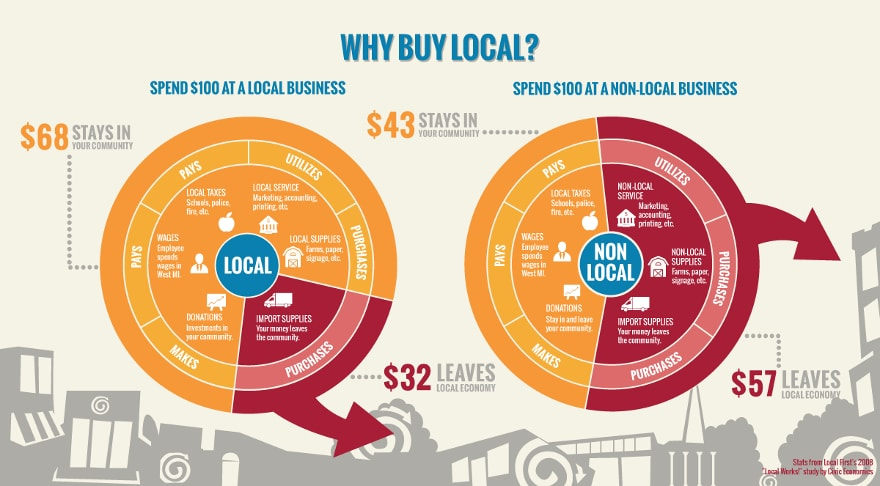Running an eCommerce business is challenging. Many struggle with whether to have their own site or simply sell on Facebook, Amazon, eBay, Etsy or other platforms. While they may be your partners, they are also your strongest competitors.

Are you a brick and mortar business with no online store? You need one – yesterday! Each new study that comes out shows that ecommerce sales are growing. Even if your in-store sales are solid, why not capture a piece of the online market, too?
Don’t feel like reading? Check out the SlideShare or watch this video which covers the high points from this post:
Own Where You Sell
It is a huge risk to only sell on a platform you do not own or control. Yes, you could spread that risk by selling on more than one of them, but you still don’t own or control where you are selling.
You never know when the rules may change such as eBay banning drop-shipping. That link says Amazon, but I know someone who was reselling from Wal-mart who is getting eBay warnings. Don’t wait until you lose your ability to sell with little notice.
So even if you choose to sell on one or more of these, I strongly recommend having your own store on a domain you own. You really must control and own your own domain. (Even if we do not really “own” them.)
Do not risk the customer base you build by selling only on someone else’s site. And get started growing your own customer base that you can upsell and remarket to regularly.
Choose the Best eCommerce Platform
It is never too late to start your own eCommerce store. Do it even if you already have an Amazon or eBay or other store somewhere. Cut out that middle man and get started increasing your average order size and repeat sales today.
Choosing the right ecommerce platform is extremely important. It must be fast, reliable and easy to use. The checkout process needs to be secure and have minimum steps – ideally a 1-step checkout.
Make sure the search function works well even for multi-word searches. Navigation should make finding products simple. And your store must definitely be SEO-optimizable.
I personally know of a business whose traffic and sales doubled simply by switching ecommerce platforms. There is no one best for everyone. So do your research and choose wisely based on the number of products you wish to sell and upselling features you need.
You could start with the link above and the January 2019 industry research on the best ecommerce platform for small business: What 78 Industry Pros Think. When comparing prices, compare total price, as some charge for features separately and others as part of the base package.
Stick to the major companies. Don’t risk your business going with others as unreliable shopping carts are common and can cost you sales. That is especially important if you are spending money on advertising to drive traffic.
Most importantly, make sure your ecommerce site requires and enforces the use of strong passwords. The last thing you need is to lose money to fraud and hacked accounts.
Competing with Amazon Shipping
Do you know what the greatest risk to individual ecommerce stores is today? I believe it is the discounted shipping deal that Amazon has arranged with USPS, FedEx and UPS that no smaller ecommerce seller can match.
Some even claim that the USPS is subsidizing Amazon’s costs of shipping.
Amazon Prime customers can get their packages in 1-2 days for free. Amazon doesn’t have to pay a premium to get them there – they actually get a discount. And now they’ve even convinced the USPS to deliver on Sunday in some areas.
They are not even charging extra for Saturday and Sunday delivery. Can your business match that? Read on for what to do about it.
What small businesses including ecommerce sellers most need to happen is to better educate consumers. They need to understand how the power of their buying dollars affects their lives beyond obtaining products they need and want.
This has always been important, and today, small businesses need to proactively educate their buyers on the benefits of buying directly from small businesses – even though it takes a few days longer to receive their packages.
What can you share with customers?
- Benefits of buying from small businesses.
- Point out why they should not support bad corporate citizens.
- Talk about the better pay and treatment small business employees receive.
- Tell them how much you appreciate their business.
- Share with them about your business, employees, and possibly family.
Many people are not aware of the importance of choosing where to spend their money. Some are because of what they’ve read on social media or in blogs or seen in videos on YouTube or Facebook.
Promote Small eCommerce Similar to Buy Local
The “Buy Local” campaigns are getting the word out well. Various groups have produced infographics like the one below that provide visual proof of how where shoppers spend their money has a great impact on their local economies.
Where are the campaigns ensuring that people understand the importance of buying online from small businesses, too? I have not seen any similar type of information being spread online in any organized manner. We need some visuals like that for ecommerce.
On Twitter, small businesses are using hashtags and sharing photos and statistics to grow their share of the market:
- #buylocal
- #shoplocal
- #eatlocal
Facebook has groups dedicated to specific locations, especially for local farmer’s markets. There are many large ecommerce groups on Facebook and LinkedIn where this can be suggested.
Use the ideas in this post to get discussions started on how to best encourage widespread support for buying directly from small businesses.
American Express sponsors an annual Small Business Saturday that occurs between Black Friday and Cyber Monday. Ecommerce businesses need to mount their own campaigns to increase awareness of the importance of supporting small business.
Spread Small Business and Customer Success Stories
Small businesses have an advantage: being small enough to care about individual customers. Learn to share your company’s and your customers’ success stories so that other potential buyers identify with them.
The #1 reason customers give for changing where they buy is that they didn’t think their current supplier cared. Make sure your customers know you care about them! See How to Make Customer Success the Heart of Your Small Business for ideas.
That can be as simple as a handwritten thank you note in every order. Or an inexpensive sample tucked in the box. Do not under-estimate the value of the little things that can set your small business apart.
Encourage shoppers to be patient enough to wait a couple extra days. What day they receive most products doesn’t matter much in the long run. Buying from individual small businesses can change the economy and environment for the better. And it is so easy to do.
You can do this collectively – through organizations – or individually using their sites, social media and email messaging. Just do it. Or someday, as in the days of buying with script and company stores, there may only be Amazon left.
Originally published 1/27/19. Updated and added video and SlideShare 4/12/19.


Small businesses have an advantage: being small enough to care about individual customers.